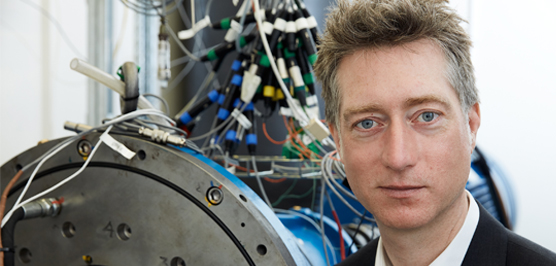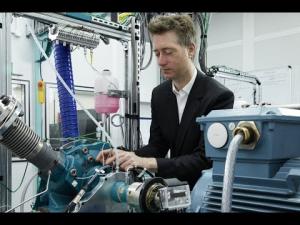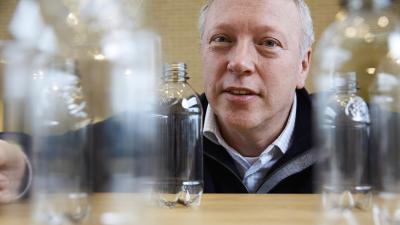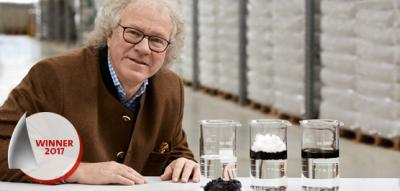Steve Lindsey
Energy-saving rotary air compressor
Finalist for the European Inventor Award 2017
Largely unchanged since the 1930s, reciprocating piston compressors use pistons to draw air into a cylinder on the outward stroke, then compress the air as it moves inward. Not just noisy, these compressors are inefficient, spending half their motion - and thus half of the energy they consume - preparing for, rather than carrying out, compression.
While alternative technologies exist, no one had found a simple, effective alternative to the piston compressor - until now.
Lindsey's Blade Compressor, licensed by his UK start-up engineering firm Lontra, offers a novel and mechanically elegant replacement. Its design transforms the cylinder section into an annular chamber. A piston blade travels the length of this chamber, compressing air in front while drawing in air behind. The Blade Compressor sidesteps a piston compressor's biggest shortcoming by compressing air continuously. Its unique geometry considerably reduces stress on moving parts, is surprisingly quiet and provides excellent sealing characteristics, which add to its efficiency.
Societal benefit
Air compressors are power-hungry machines. In Europe, they represent about 10% of total industrial energy consumption. In some sectors, such as water purification and manufacturing, this can rise to over 40%. Tackling the issue of energy efficiency head-on, Lindsey demonstrated during a 2012 test trial at a UK wastewater treatment facility that his Blade Compressor could slash electricity consumption by more than 20%.
Lontra sees wastewater treatment as one of the primary sectors that could benefit from the Blade Compressor's efficiency. However, it could just as easily be employed in cement production, at paper pulp plants and in numerous manufacturing processes - essentially for any application requiring air pressure up to 10 bar.
According to Lontra, given the breadth of its potential uses, the Blade Compressor could save two terawatt hours of electricity in Europe a year (roughly the energy consumption of a city of 200 000 households) and 860 000 tonnes of CO2. In recognition of this promise, Lontra received support from the Carbon Trust, a UK firm that helps companies to cut carbon emissions.
Lontra plans to expand the use of the Blade Compressor technology to include automotive superchargers. This could lead to the development of smaller, more efficient engines that deliver equal, if not better, performance than today's models.
Economic benefit
The Blade Compressor might breathe new life into the rather stagnant global air-compressor market, estimated to be worth at least EUR 23.5 billion a year. Rather than operating as a manufacturer, Lontra is run as an intellectual property firm, licensing Blade Compressor technology for use in various industries. In 2014, Lindsey's company closed a deal with Swiss pump manufacturer Sulzer reportedly worth EUR 717 million to supply the technology to wastewater treatment plants. This will see the Blade Compressor sold across 150 countries.
In 2016, Lontra won EUR 50 000 in funding from the EU's Horizon 2020 programme, which targets SMEs showing the greatest potential to develop significant new products for a global market. Lontra will focus on introducing Blade Compressor technology into the food and pharmaceutical sectors, where it will be used for pneumatic conveyors - a common method of moving products and materials during production by blowing them through tubes.
Lontra has also agreed to a partnership with UK-based Shield Group Engineering. Their first joint project looked at ways to streamline mass production and offer substantial manufacturing capacity to licensees and partners.
How it works
Instead of moving a piston back and forth in a cylinder, the Blade Compressor uses a piston blade inside an annular (circular) chamber. As the blade travels along the chamber, it pulls air in behind it through an inlet while compressing air in front. Compressed air is released just before the piston blade slides through a slit in a spinning disc, which bisects the chamber: the air that was behind the piston is now in front of it and is compressed while more air is drawn in from what is now behind the blade.
Thanks to the angle of the compressor blade, both the compression and induction cycles cover more than 360 degrees, travelling de facto 390 degrees, meaning that the induction and compression cycles overlap.
Drawing in and compressing air simultaneously is the Blade Compressor's key efficiency advantage over traditional piston compression. Unlike a regular piston compressor, which has to stop and change direction, Lindsey's device features a blade rotating endlessly in one direction, never stopping and starting. This makes it smoother, quieter and more reliable. Its design also provides very good sealing, reducing air leakage and leading to significant improvements in efficiency and hence reductions in energy usage.
The inventor
Stephen Lindsey developed a problem-solving mind-set at a young age while helping his father with mechanical and technical projects that he brought home from the National Physical Laboratory - the UK's measurement standards research institute. Lindsey went on to study chemistry at Bristol University, before working at a consultancy firm as a technical project manager.
Lindsey readily admits he was no expert in compressor design when he first looked at the field in the early 2000s. However, his expertise grew as the idea took hold to improve a widely used, but often overlooked, technology. He applied for a patent for the Blade Compressor in 2003, set up Lontra in 2004 to continue his work, and brought his invention to market in 2016.
A passionate advocate of entrepreneurism and small and medium-sized enterprises, Lindsey won the UK's Manufacturing Entrepreneur of the Year award in 2015. His Blade Compressor was named the "most innovative new technology of the year" at the Water Industry Achievement Awards (2013) and honoured as the top energy product at the Environment and Energy Awards (2015).
Aside from his business interests, Lindsey is a motorsport enthusiast. He has raced professionally and worked as a test driver for Audi.
Did you know?
While not a simple invention per se, Lindsey's Blade Compressor takes an elegantly simple approach to solving what had been a glaring flaw in the geometry of traditional piston compressors - the wasted motion of the backstroke. In doing so, Lindsey's invention joins the ranks of other brilliantly simple inventions that defied decades of conventional wisdom. Thinking "outside the box" often requires more than just a flash of brilliance and hard work: it requires the fortitude to defy nay-sayers and prevail against long-entrenched engineering prejudices.
Inventors revisited
In 2020, the EPO reconnected with former finalists and winners for their views on trends in innovation and intellectual property, and a rare glimpse at cutting-edge new research and inventions.

Towards smart factories
When Steve Lindsey invented a new type of compressor that cuts energy usage by some 30%, he decided to license his technology to a network of partners. Following the European Inventor Award in 2017, he made a change to his intellectual property strategy and now manufactures his compressor. He also has an ambitious new plan: to revolutionise industry in the UK's first smart factory.

Talk innovation
Guided by the principal of using engineering to change the world, Steve Lindsey invented a new type of compressor that cuts energy usage by some 30%. He applies the kind of thinking that revolutionised the consumer world to industry. The result? The UK’s first smart factory, where a network of connected machines reduce waste, improve sustainability, and increase productivity.
Media gallery
Patent numbers:
Contact
European Inventor Award and Young Inventors Prize queries:
european-inventor@epo.org Subscribe to the European Inventor Award newsletterMedia-related queries:
Contact our Press team#InventorAward #YoungInventors








